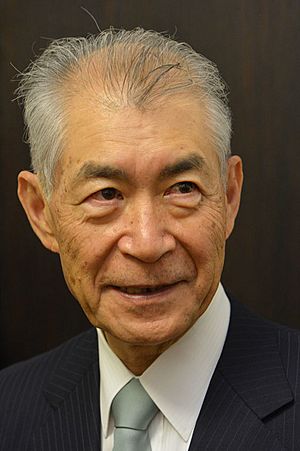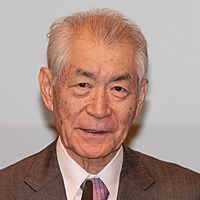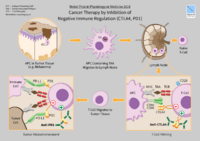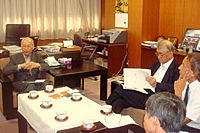Tasuku Honjo facts for kids
Quick facts for kids
Tasuku Honjo
|
|
|---|---|
| 本庶 佑 | |

Honjo in 2013
|
|
| Born | 27 January 1942 |
| Nationality | Japanese |
| Education | Kyoto University (BS, MD, PhD) |
| Known for |
|
| Awards |
|
| Scientific career | |
| Fields | Molecular Immunology |
| Institutions | Kyoto University |
| Doctoral advisor | |
| Notable students | Shizuo Akira |
Tasuku Honjo (本庶 佑, Honjo Tasuku, born January 27, 1942) is a Japanese doctor and scientist. He is an immunologist, which means he studies the body's immune system. He won the 2018 Nobel Prize in Physiology or Medicine for his important discoveries.
Dr. Honjo is best known for finding a special protein called programmed cell death protein 1 (PD-1). This discovery has been very helpful in developing new ways to treat cancer. He also found important signals in the body called IL-4 and IL-5. Additionally, he discovered a key protein called AID, which helps our immune system make different kinds of antibodies.
He was chosen to be a member of important science groups around the world. These include the National Academy of Sciences in the United States and the Japan Academy. In 2018, he shared the Nobel Prize with James P. Allison. They had also won the Tang Prize together in 2014 for their work on cancer treatments.
Contents
Life and Career
Tasuku Honjo was born in Kyoto, Japan, in 1942. He studied medicine at Kyoto University and became a medical doctor in 1966. Later, in 1975, he earned his Ph.D. in Medical Chemistry from the same university.
After his studies, Dr. Honjo worked as a researcher in the United States. From 1971 to 1973, he was at the Carnegie Institution of Washington. Then, he moved to the U.S. National Institutes of Health (NIH) in Maryland. There, he studied how genes affect the immune system.
He also held several professor positions in Japan. He taught at the Tokyo Medical University and Osaka University. From 1984 to 2005, he was a professor at Kyoto University. Since 2005, he has been a professor in the Department of Immunology and Genomic Medicine at Kyoto University. He also led a university in Shizuoka from 2012 to 2017.
Dr. Honjo is a member of the Japanese Society for Immunology. He was also its president for a time. Since 2017, he has been a top professor and leader at the Kyoto University Institute for Advanced Study.
Misinformation During the COVID-19 Pandemic
During the COVID-19 pandemic, some false claims spread online. These claims said that Dr. Honjo believed the coronavirus was made in a lab. However, Dr. Honjo clearly stated that these claims were untrue. He said he was "greatly saddened" that his name was used to spread "false accusations and misinformation."
Important Discoveries
Dr. Honjo's research has greatly helped us understand the immune system. He explained how our bodies make different kinds of antibodies. He showed how antibody genes rearrange themselves. He also found the DNA structure that proves this process.
In 1986, he successfully identified IL-4 and IL-5. These are important signaling molecules, called cytokines, that help control immune responses. In 2000, he discovered a protein called AID. He showed that AID is very important for the immune system to create a wide variety of antibodies.
One of his most significant discoveries was in 1992. He found a protein called PD-1 on immune cells. This discovery was a big step forward for cancer immunotherapy. By blocking PD-1, doctors can help the body's own immune system fight cancer more effectively.
Awards and Honors

Dr. Honjo has received many awards for his scientific work. In 2016, he won the Kyoto Prize for his discoveries about antibodies and immune regulation. This prize also recognized how his work led to new medical treatments.
In 2018, he shared the Nobel Prize in Physiology or Medicine with American immunologist James P. Allison. They both received this top honor for their work on cancer immunotherapy. Before the Nobel Prize, they also shared the Tang Prize in 2014.
Major Awards
Here are some of the major awards Dr. Honjo has received:
- 1981 – Noguchi Hideyo-Memorial Award for Medicine
- 1981 – Asahi Prize
- 1984 – Kihara Prize, Genetics Society of Japan
- 1984 – Osaka Science Prize
- 1985 – Erwin von Baelz Prize
- 1988 – Takeda Medical Prize
- 1992 – Behring-Kitasato Award
- 1993 – Uehara Prize
- 1996 – Imperial Prize of the Japan Academy
- 2000 – Person of Cultural Merit
- 2001 – Foreign Associate of U.S. National Academy of Sciences.
- 2012 – Robert Koch Prize
- 2013 –
 Order of Culture
Order of Culture - 2014 – William B. Coley Award
- 2014 – Tang Prize in Biopharmaceutical Science
- 2015 – Richard V. Smalley, MD Memorial Award
- 2016 – Kyoto Prize
- 2016 – Keio Medical Science Prize
- 2016 – Fudan-Zhongzhi Science Award
- 2016 – Thomson Reuters Citation Laureates
- 2016, 2017, 2019 – Asian Scientist 100, Asian Scientist
- 2017 – Warren Alpert Foundation Prize
- 2018 – Nobel Prize in Physiology or Medicine
Honorary Degrees
Dr. Honjo has also received special honorary degrees from universities:
- 2020 - Macau University of Science and Technology, China
- 2021 - University of British Columbia, Canada
- 2024 - National Taiwan University, Taiwan (He was the first Japanese person to receive an honorary doctorate from NTU).
See also
 In Spanish: Tasuku Honjo para niños
In Spanish: Tasuku Honjo para niños
- List of Japanese Nobel laureates
- List of Nobel laureates affiliated with Kyoto University
- Kyoto University
- Shinya Yamanaka
 | Isaac Myers |
 | D. Hamilton Jackson |
 | A. Philip Randolph |




